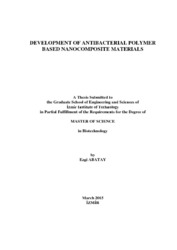Please use this identifier to cite or link to this item:
https://hdl.handle.net/11147/4442| Title: | Development of Antibacterial Polymer Based Nanocomposite Materials | Other Titles: | Antibakteriyel Polimer Esaslı Nanokompozit Malzemelerin Geliştirilmesi | Authors: | Abatay, Ezgi | Advisors: | Arslanoğlu, Alper Tanoğlu, Metin |
Keywords: | Nanocomposites Antibacterial agents Polymers |
Publisher: | Izmir Institute of Technology | Source: | Abatay, E. (2015). Development of antibacterial polymer based nanocomposite materials. Unpublished master's thesis, İzmir Institute of Technology, İzmir, Turkey | Abstract: | Human beings are often infected by microorganisms such as bacterium, mold, yeast, virus, etc. in the living environment. It became a requirement and a necessity to create sterile fields in areas. Composite stones are one of the main materials that can be used for the contact surfaces in indoor and outdoor places due to their being of highly resistant to abrasives, chemicals and impacts. Research has been intensive in antibacterial material containing various inorganic substances. The aim of this thesis is investigating the antibacterial effect of inorganic substances such as silver, zinc oxide, calcium oxide, titanium oxide and magnesium oxide on stone products. This study also deals with the silver doped zinc oxide powder and their antibacterial efficacies. Stone product is formed of mainly two type compound which are quartz aggregates as reinforced and filler and thermoset polyester resin as matrix. The manufacturing process begins with selection of raw quartz materials. They are crushed and blended in the ratio of 90 % quartz aggregates to 10% polyester matrix and other additives such as antibacterial agent, pigment. These united constituents are used for production of composite stones by applying those combined vacuum, vibration and pressing processes which are named as vibropress, simultaneously. Following it, they are subjected to surface preparation and polishing processes. In this study, mechanical, thermal, and morphological properties of the particles, polyester matrix and stone product were investigated. Antibacterial efficacies of these were investigated based on colony-count method against gram negative (E.coli) and gram positive (Bacillus subtilis) bacteria. Silver-containing stone samples showed best antibacterial property about ninety-nine percent reduction. | Description: | Thesis (Master)--Izmir Institute of Technology, Biotechnology, Izmir, 2015 Full text release delayed at author's request until 2018.04.15 Includes bibliographical references (leaves: 82-85) Text in English; Abstract: Turkish and English xv, 85 leaves |
URI: | http://hdl.handle.net/11147/4442 |
| Appears in Collections: | Master Degree / Yüksek Lisans Tezleri Sürdürülebilir Yeşil Kampüs Koleksiyonu / Sustainable Green Campus Collection |
Files in This Item:
| File | Description | Size | Format | |
|---|---|---|---|---|
| T001373.pdf | MasterThesis | 4.09 MB | Adobe PDF |  View/Open |
CORE Recommender
Page view(s)
402
checked on Apr 28, 2025
Download(s)
216
checked on Apr 28, 2025
Google ScholarTM
Check
Items in GCRIS Repository are protected by copyright, with all rights reserved, unless otherwise indicated.